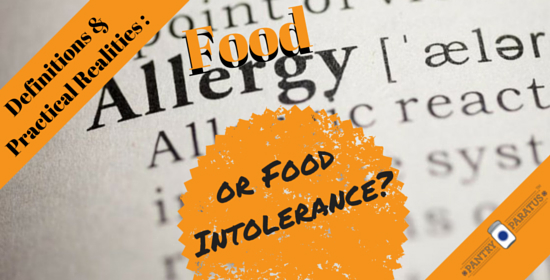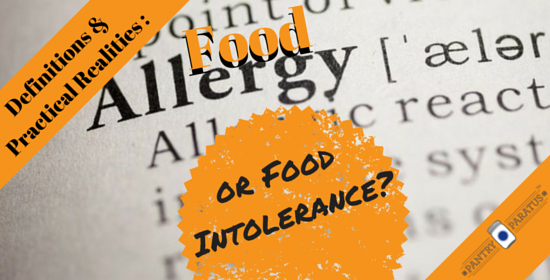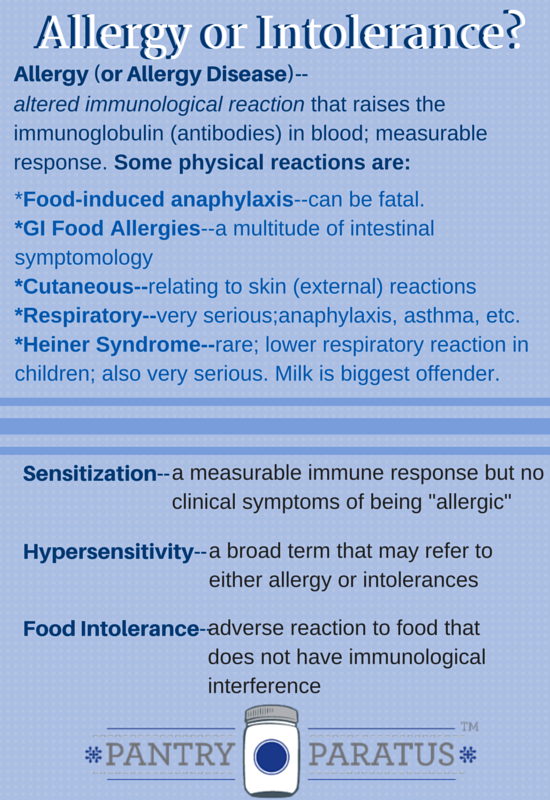
I felt the need for legitimacy. The doctor said not to bother.
“I don’t know if it is an allergy or sensitivity,” I said.
“Does it matter?” he asked.
“Yes, well…maybe.”
“Look, it poisons your son. It is a severe reaction no matter what you choose to call it. False positive rates are high, and learning that it is or isn’t an allergy doesn’t minimize his physical reaction or your need to avoid it….does it?” The doctor took a visible pause and continued, “If it were me, I’d skip the allergy test on him. You would have to poison him with the corn to determine that corn is a poison…to learn what you already know.”
Well, when he put it that way, I decided that it was okay not to learn—in our situation—the difference between food allergy and food sensitivity or intolerance. We were not dealing with a physical reaction (such as anaphylactic shock , respiratory problems, or rashes, etc) but instead with a neurological one. Fast forward to a new town, new doctor one year later:
“I wouldn’t do the allergy test,” the new pediatrician said.
“Really? Why not?” I felt compelled to ask, and I heard the same answer, nearly verbatim, but this one added, “If you know it’s corn avoid corn. It’s that simple.”
That simple, eh? Snort.
*********
I am not implying that either of these pediatricians is right or wrong; simply that in my anecdotal experience there are doctors out there that see the difference between allergy and sensitivity in pragmatic terms. By either name, the food makes you sick. Avoid it.
I cannot say that I entirely agree. First, a true allergy can become a medical emergency. You need to know and you need to be prepared for that scenario. Secondly, we often only get bits and pieces of nutritional science through food blogs, margarine commercials or the latest medical television show: food science is highly prone to fads. I thought I was gluten-intolerant for years but misdiagnosed myself. Gluten had nothing to do with it—dead flour did. I now attribute home-milled flour for giving me a vibrant and active lifestyle. According to WebMD, 15% of Americans believe they have a food allergy, while only 3-4% actually do. Finally, while the practical reality is that you are sick regardless of the proper term “allergy vs. intolerance,” the term connotes different physiological reactions that require different interventions, some that go beyond “just avoid it.”

Definitions: Let’s make sure we’re talking about the same thing
I’m not a licensed nutritionist. I’m a concerned mother and a professional that has spoken to countless other concerned parents who are grasping at the hope of food solutions to innumerable physical, emotional, and psychological problems within their families. Don’t just believe everything I say. You can use this as a jumping off place for your own research. I have a Masters of Science in Psychology and I can “speak geek” and comb the prevalent literature—that’s really all I have to offer you—no medical opinions or advice here. I do believe we need to start with the scientific community’s definitions. If we are not speaking about the same things, misinformation shall prevail. It is important to understand that medical professionals and scientists specializing in the field of allergies had a full two year debate about the definitions themselves. There are no easy answers.
NOTE: Celiac Disease is considered wholly different from non-Celiac Disease allergies. Much of the following information is in no way related to Celiac Disease since Allergy Experts define and treat it differently.
The World Allergy Organization defines “allergy” as a hypersensitivity reaction initiated by specific immunologic mechanisms (Fiocchi, 2010). Basically, a true allergy has both clinically defined symptoms (such as swelling, skin conditions, respiratory conditions, or digestive maladies), but it will also have a clear and quantifiable spike in immuniglobin (antibodies) present in your blood. Food intolerance and hypersensitivity (by itself) are physical reactions to food that do not sound your Immune System Alert or put your blood cells in full battle gear. The pain and physiological symptomology is very real—even dangerous—in either case. One is not more legitimate than the other. They are, however, different.
Myths & Misinformation
When studied in the world’s laboratory, allergen prevalence changes country-by –country. Australia has a high level of peanut allergy, but sesame is a high-offender in Israel. Ironically, egg is considered the highest offender in nearly all nations studied by the World Allergy Organization (WAO); but they conclude that “the most representative allergen is a hand-maiden to local customs, (p. 63, Fiocchi, 2010)” meaning that common allergies (whether perceived & self-reported or actually studied) seem to relate closely to the common diet.

***Rabbit Trail: it is for this reason of increased exposure/allergy ratio, that I reassure my son that corn-free choices will eventually become more common, since 95% of food in the grocery store contains corn in some form, even the wax on fresh fruit!
Some foods get nuthin’ but bad press in America—foods that are considered highly allergic sometimes have very low instances of allergic reactions. The fear surrounding allergies create a culture of avoidance when it is not necessary. If something is wrong and yet undiagnosed, seeing the appropriate health professional will put you further ahead in both identifying the problem and in moving beyond it.
Here are a few common myths you might have heard:
Beekeeping is Dangerous Due to Bee Sting Allergies
Well, any livestock of any type can be dangerous, says the lady who’s had chicken-claw scratches near the eyes. When Wilson first wanted to learn beekeeping, I was dead-set against it. We lived in a neighborhood (not a homestead) with rather crochety neighbors. I thought, “great, someone is going to be allergic to bees, get stung, and it’ll be on us!”
Wilson decided that what I needed was information to replace the fear, so he loaded 4 different beekeeping books onto my nightstand. I quickly changed my mind with this fact: Although any sting will hurt (and perhaps swell or turn red), most “bee” reactions are actually to yellow jackets and other wasps, or to other bee species like the bumblebee, but not to the honey-producing bee. Since honey bees sacrifice their lives to sting, they very rarely do (yellow jackets are another matter altogether). Honey bee stings are rare and allergies to those stings are rarer, still. The likelihood of allergy does increase with frequent stinging.
Oh, and as an aside, honey bees fly up-and-out from their nest and travel for miles—your next door neighbors are at less of a risk than people 2 blocks away with a pond. If you are concerned that you may be allergic to bees prior to your own beekeeping or to a neighbor’s penchant for honey, you can get tested for bee venom (which is a completely different venom leading to a different immune response than wasp venom).
Peanut Allergies are really common.
No, they are not. Only .6% (less than 1%) of Americans have a peanut allergy (Managing Peanut Allergies). But peanuts are the most common food allergy. It is also a severe one in which anaphylaxis shock is a very real threat. The good news is that nearly 20% of children with peanut allergies are likely to grow out of them. The bad news is that peanut allergies have tripled in the last 15 years. Penny Kane has a theory that it relates to the cross-contamination of farming practices in which peanuts are grown in the same fields as cotton; since cotton is not a food product, different pesticides are used than are used for food products, but the contaminants reside in that soil. I cannot prove it, but she has researched it and it does sound likely, doesn’t it?
A wheat allergy & celiac disease is the same thing.
Actually, no they are not, although both are an immunological response. A wheat allergy can affect someone in various ways just like any allergy. Celiac Disease will not cause anaphylaxis, but instead affects the small intestines. This means that the individual can lose the ability to absorb nutrients and may become malnourished, as well as having other symptoms. If a wheat allergy is a possibility, please get an allergy test—nearly 20% of people with a wheat allergy are allergic to other grains, too.
Practical Realities of Food Allergies
There is no definitive cure. Avoidance is the official recommendation.
There are some theories that long-term avoidance can reverse some food allergies and food intolerance, as evidenced by the GAPS diet. Such diets are far from mainstream and have varying levels of success. Since every doctor will say that avoidance is absolutely necessary, most will likely shrug their shoulders when you mention a diet based upon that premise. They may, however, draw concern from the radical nature of such diets and might try to dissuade you on that concern alone. World-renowned experts in the field of Immunology state that the development of food tolerance (outgrowing an allergy) is poorly understood. They must admit that they just don’t know what allows for someone to leave an allergy behind or why some allergies persist regardless of treatment. Our family personally credits the GAP diet for identifying my son’s corn allergy (intolerance???) in the first place: it took a radical diet to truly eliminate such a common food ingredient. We did not stay on the diet long-term as proponents recommend for full gut healing. I’m sure it would be good for us, but such a diet is not simple, easy, or cheap.
Immunotherapy (allergy shots) can have up to a 97% rate of effectiveness in preventing future allergic reactions, can actually cure certain forms of allergy, and can even have long-term savings for the patient who would otherwise have to take long-term medications. Immunotherapy options center around things such as asthma and hay fever at this time, but it’s worth checking out with an Allergist.
For our family, whether it is a true “allergy” or not, the consequences of exposure are severe and life-altering. We really do not feel the need to divulge the details to every curious passerby, and so we just say, “he has a corn allergy” and be done with it already. As a mom, I have to live with the consequences that come with the immediate reaction (with onset about a half hour after ingestion but symptoms lasting approximately 5 days). I have to live with this–while the curious passerby does not– so I personally choose to just give the short/sweet terminology with the desired affect: they won’t question or test me, and it helps to respect my son’s privacy by using the strongest word I can think of (“allergy”) that doesn’t require an in-depth explanation.
Finding Health with Food Issues
The quest for health can certainly be an all-consuming one. Sometimes one almost wishes for an allergy, because it’s a tangible diagnosis from which one can proactively cope, move on, and heal. Sometimes the quest for health isn’t so simple as that, sometimes allergy tests cannot pin it down, sometimes it isn’t even food at all. Ask my friend Erin, The Reluctant Naturalist, and she’ll tell you—the news of food allergies or food intolerances can, within itself, be devastating…but at the end of the day there is a hope that just maybe you will find a “new normal.”
That is my hope for you, too…that you will be able to identify and heal from that which ails you—whatever name or definition it might have.
Be Nourished,
Chaya
Cuz’ a blog like this warrants a…
Proviso: Nothing in this blog constitutes medical or legal advice. You should consult your own physician before making any dietary changes. Statements in this blog may or may not be congruent with current USDA or FDA guidance.
So glad you joined us! You can keep up on all of the happenings with our newsletter (every few weeks) and with a weekly blog update…those are 2 separate lists, so pick what’s right for you & jump in!
Blog Sources:
Dimov, V. (2007, August 24. Updated 2010, August 15.). AllergyCases.org. Retrieved December 14, 2014, from http://allergycases.blogspot.com/2005/06/venom-allergy-short-review.html
Fiocchi, A., Schunemann, H., & Bahna, S. , et al. (2010, April 1). World Allergy Organization (WAO) Diagnosis and Rationale for Action against Cow’s Milk Allergy (DRACMA) Guidelines. Retrieved December 10, 2014, from http://www.worldallergy.org/publications/WAO_DRACMA_guidelines.pdf
Guidelines for the Diagnosis and Management of Food Allergy in the United States: Report of the NIAID-Sponsored Expert Panel. Journal of Allergy and Clinical Immunology , Volume 126 , Issue 6 , S1 – S58
You can read it for yourself here: http://www.jacionline.org/article/S0091-6749%2810%2901566-6/fulltext
Managing Peanut Allergies. (n.d.). Retrieved December 11, 2014, from http://www.peanutallergyfacts.org/peanut-allergy-facts
Erica Mueller
posted on Monday, December 15, 2014 10:21:32 AM America/Denver
Tracy
posted on Wednesday, December 17, 2014 5:00:39 PM America/Denver


Thanks for mentioning that allergies are a measurable reaction! My wife and I have felt a bit off when we eat soy recently but we’re unsure if it’s an allergy or intolerance. We’ll be sure to keep your facts in mind as we find somewhere to get tested!